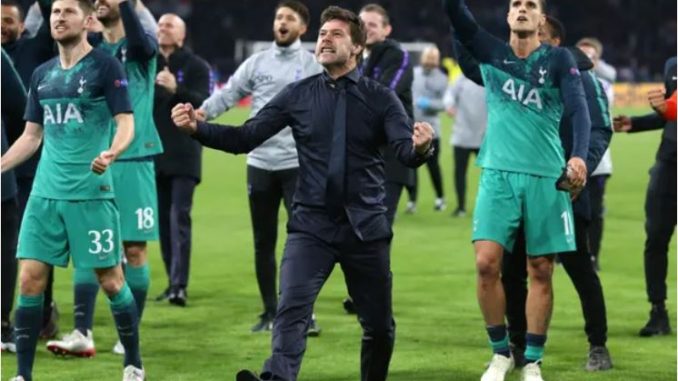
ürgen Klopp grinning with all those mesmerising teeth. Mauricio Pochettino in bits and tie askew, like the father of the bride waving off his daughter on her wedding night. Glenn Hoddle dancing a jig in the studio while the nation feared for his ticker. Has there ever been a week like this one for England’s football clubs?
For people who had paid those very-hard-to-justify subscriptions to Sky and BT, or who found the right excuses for four consecutive nights in the pub, there has been a sustained injection of head-shaking, armchair-roaring miracle. How might you objectively measure such a week against all the weeks that have gone before? Careful linguistic analysis of punditry shows the word “unbelievable” was uttered more frequently, and in a greater variety of accents, than on any previous occasion. (Jordan Henderson, the lion-hearted Liverpool captain, managed a dozen utterances single-handedly to the TV interviewer, while his teammates sang “You’ll Never Walk Alone” back to the Kop.)
One drama led to the next and each borrowed significance from the last. The week began with the noble Belgian Vincent Kompany, whose recent career has involved brief windows of fitness in long absences through injury, lashing in the ultimate captain’s goal for Manchester City, one that seems likely to see them triumph in perhaps the most fiercely contested of all Premier league seasons this afternoon.
For every winner, there is usually a loser and commiseration appeared suddenly due to Liverpool, now staring at double defeat – both at home and in Europe – as they faced Messi and Barcelona, with a three-goal deficit and without two of their most potent forwards. There were, no doubt, several stirring band-of-brothers calls to arms during the week, but the one that surfaced most resonantly from the dressing-room belonged to Klopp: “I said to the boys before the game it was impossible,” he recalled. “But because it’s you boys, I say we have a chance.” And so, thrillingly, unbelievably, it proved.
Inconceivable comebacks went viral. Spurs’ boss, Pochettino, used the example of Liverpool to give his players faith as they approached 45 minutes to find three goals of their own in Amsterdam. “There’s something happening,” said Jermaine Jenas in the commentary box, divining portents as the first of Lucas Moura’s hat-trick goals went in. And everyone watching, and everyone playing, seemed to feel something too, as if the magic of the previous night had taken on an inevitability. Moura, a Brazilian prodigy who had lately lost his way, clearly felt it more than anyone. He joined Liverpool’s Divock Origi, the newly famous Belgian, as an unlikely saviour, seizing the day at the very last.
After those most dramatic triumphs, the successes of Arsenal and Chelsea the following evening completed an unprecedented clean sweep for English clubs in European finals. Predictably, the leaders of our beleaguered political parties have tried to make capital from the drama, trading lame jokes about “victory in Europe” in the House of Commons. If the English clubs’ triumphs demonstrated anything, however, it was clearly that strength lay not in narrow nationalism, but in the Premier League’s openness to pool and invest in skill and courage, no matter its country of origin.
It goes without saying that most of the heroes of those electric nights had come here from elsewhere, but, alongside such vivid homegrown talents as Trent Alexander-Arnold and Dele Alli, each one had clearly bought into a rooted mythology passed down through generations. Origi and Moura demonstrated the same spirit that once inspired Danny Blanchflower and Jimmy Greaves at Tottenham and Ian Rush and Kenny Dalglish in Liverpool.
Football is often asked to provide metaphors for more serious endeavour. But one simple lesson our – now all-conquering – club teams can offer is this: great institutions sustain themselves over decades by retaining their principles and heart while embracing change, never by trying to turn back the clock.
END

Be the first to comment